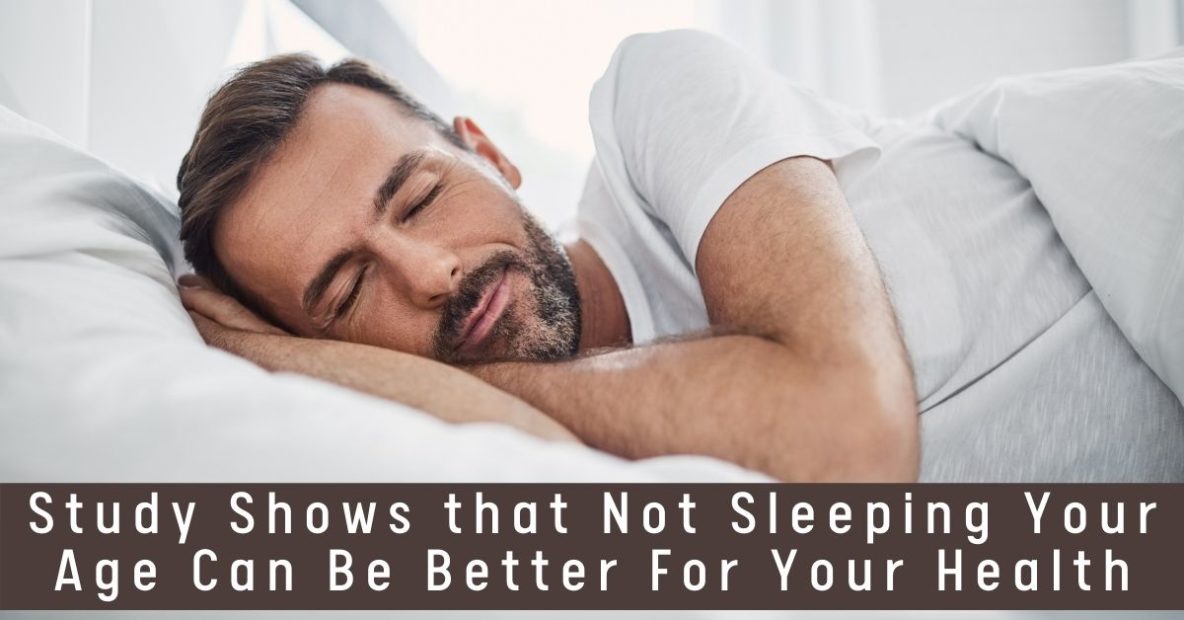Study Shows that Not Sleeping Your Age Can Be Better For Your Health

- A Promising Paradigm Shift: New Research Challenges the CPAP-First Approach to OSA Treatment - September 5, 2023
- Understanding Sleep Meditation Techniques - July 30, 2021
- How Online Learning Has Affected Sleep for Students - July 13, 2021
Older adults often sleep less than younger adults. Not only that, they also spend less time in deep sleep and REM sleep. A recent study found that older adults who aren’t getting enough sleep age faster, and that “not sleeping your age” can be better for your health!
Do Older Adults Sleep Less?
As you get older, you may start to sleep less. That’s because your body’s circadian rhythm, or biological clock, doesn’t regulate your sleep and waking cycle as well as it used to. This means you may struggle to feel alert in the morning, or feel tired in the middle of the afternoon.
One reason for this change is just the wear and tear on your body during your lifetime. Other reasons can include:
- Not getting enough sun exposure. Being in sunlight every day regulates the circadian rhythm, and you’ll be more alert following sun exposure.
- Changes in hormones, such as not enough production of melatonin, the hormone that regulates sleep.
- The flexible schedule you have during retirement. You may have lots of time for napping, and have a less structured sleep schedule.
- Higher levels of stress, anxiety, or social isolation.
- Waking up more often during the night.
- Discomfort or pain.
Studying Sleep in Older Adults
Scientists and doctors have been studying the relationship between sleep and health in older adults. A 2020 study by a team of researchers at Harvard Medical School in Boston found that older adults need the same amount of sleep as younger adults. In fact, older adults with sleep patterns that were very similar to younger adults’ sleep patterns were in better health.
The study examined the sleep patterns of over 3,800 people, and looked for length of sleep, sleep disturbances, overall amount of REM sleep, and the length of each sleep cycle. Then they looked at participants’ overall health and wellbeing. Older adults who slept like younger adults had better cognitive and physical health compared to older adults who weren’t sleeping well.
Older adults with “younger” sleep patterns performed better on cognitive tests, and had a lower risk of certain health problems such as cardiovascular disease or diabetes. Older adults with “older” sleep patterns performed worse on cognitive tests and were more likely to have other health problems.
What are “Younger” Sleeping Patterns?
Healthy adults of all ages should be sleeping between 7 to 9 hours every night, regardless of age. “Younger” sleep patterns include:
- Falling asleep within a few minutes of going to bed.
- Staying asleep throughout the night, with no long periods of wakefulness in the middle of the night.
- Waking up feeling refreshed and energetic.
- Feeling alert throughout most of the day.
- Getting adequate REM sleep throughout the night.
- Getting adequate deep sleep throughout the night.
Older adults with young sleep patterns feel more energetic during the day, and they have an easier time sleeping at night. They also have better cognitive and mental abilities than older adults who aren’t sleeping well.
How to Sleep Better
Are you worried you’re sleeping your age? Here are some ways to not sleep your age, and feel younger.
Exercise: Never underestimate the power of getting active. Regular exercise helps you fall asleep faster and have better quality of sleep during the night.
Get more sun exposure: Since sunlight helps your body regulate your sleeping and waking cycle, it’s important that you spend some time in the sun every day. We recommend spending at least one hour in the sun every day. It’s a great idea to spend some time outside, but even sitting in front of a sunny window can help your body know it’s time to be alert.
Stick to a sleep schedule: If you’re retired, it’s easy to lay in bed in the mornings, or change your sleep schedule every day. However, one great way to sleep younger is to keep a consistent sleep schedule, getting up and going to bed at the same time every day. This helps your body keep a healthy sleep routine.
Sound Sleep Medical
Other reasons that could be preventing you from sleeping younger include sleep disturbances such as sleep apnea. If you’ve been having a hard time sleeping through the night, visit us at Sound Sleep Medical, and find out how you can sleep better.
